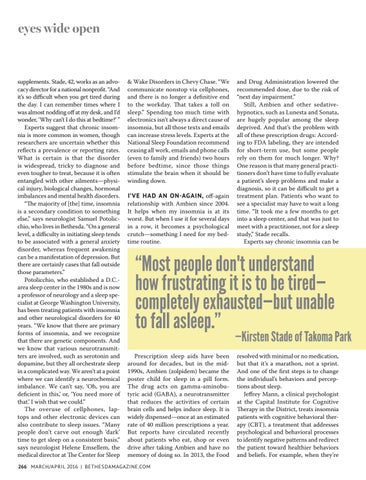eyes wide open
supplements. Stade, 42, works as an advocacy director for a national nonprofit. “And it’s so difficult when you get tired during the day. I can remember times where I was almost nodding off at my desk, and I’d wonder, ‘Why can’t I do this at bedtime?’ ” Experts suggest that chronic insomnia is more common in women, though researchers are uncertain whether this reflects a prevalence or reporting rates. What is certain is that the disorder is widespread, tricky to diagnose and even tougher to treat, because it is often entangled with other ailments—physical injury, biological changes, hormonal imbalances and mental health disorders. “The majority of [the] time, insomnia is a secondary condition to something else,” says neurologist Samuel Potolicchio, who lives in Bethesda. “On a general level, a difficulty in initiating sleep tends to be associated with a general anxiety disorder, whereas frequent awakening can be a manifestation of depression. But there are certainly cases that fall outside those parameters.” Potolicchio, who established a D.C.area sleep center in the 1980s and is now a professor of neurology and a sleep specialist at George Washington University, has been treating patients with insomnia and other neurological disorders for 40 years. “We know that there are primary forms of insomnia, and we recognize that there are genetic components. And we know that various neurotransmitters are involved, such as serotonin and dopamine, but they all orchestrate sleep in a complicated way. We aren’t at a point where we can identify a neurochemical imbalance. We can’t say, ‘Oh, you are deficient in this,’ or, ‘You need more of that.’ I wish that we could.” The overuse of cellphones, laptops and other electronic devices can also contribute to sleep issues. “Many people don’t carve out enough ‘dark’ time to get sleep on a consistent basis,” says neurologist Helene Emsellem, the medical director at The Center for Sleep
& Wake Disorders in Chevy Chase. “We communicate nonstop via cellphones, and there is no longer a definitive end to the workday. That takes a toll on sleep.” Spending too much time with electronics isn’t always a direct cause of insomnia, but all those texts and emails can increase stress levels. Experts at the National Sleep Foundation recommend ceasing all work, emails and phone calls (even to family and friends) two hours before bedtime, since those things stimulate the brain when it should be winding down.
I’ve had an on -again, off-again relationship with Ambien since 2004. It helps when my insomnia is at its worst. But when I use it for several days in a row, it becomes a psychological crutch—something I need for my bedtime routine.
and Drug Administration lowered the recommended dose, due to the risk of “next day impairment.” Still, Ambien and other sedativehypnotics, such as Lunesta and Sonata, are hugely popular among the sleep deprived. And that’s the problem with all of these prescription drugs: According to FDA labeling, they are intended for short-term use, but some people rely on them for much longer. Why? One reason is that many general practitioners don’t have time to fully evaluate a patient’s sleep problems and make a diagnosis, so it can be difficult to get a treatment plan. Patients who want to see a specialist may have to wait a long time. “It took me a few months to get into a sleep center, and that was just to meet with a practitioner, not for a sleep study,” Stade recalls. Experts say chronic insomnia can be
“Most people don't understand how frustrating it is to be tired— completely exhausted—but unable to fall asleep.”
—Kirsten Stade of Takoma Park
Prescription sleep aids have been around for decades, but in the mid1990s, Ambien (zolpidem) became the poster child for sleep in a pill form. The drug acts on gamma-aminobutyric acid (GABA), a neurotransmitter that reduces the activities of certain brain cells and helps induce sleep. It is widely dispensed—once at an estimated rate of 40 million prescriptions a year. But reports have circulated recently about patients who eat, shop or even drive after taking Ambien and have no memory of doing so. In 2013, the Food
resolved with minimal or no medication, but that it’s a marathon, not a sprint. And one of the first steps is to change the individual’s behaviors and perceptions about sleep. Jeffrey Mann, a clinical psychologist at the Capital Institute for Cognitive Therapy in the District, treats insomnia patients with cognitive behavioral therapy (CBT), a treatment that addresses psychological and behavioral processes to identify negative patterns and redirect the patient toward healthier behaviors and beliefs. For example, when they’re
266 march/april 2016 | BethesdaMagazine.com
HEALTH_insomnia.indd 266
2/5/16 3:33 PM
